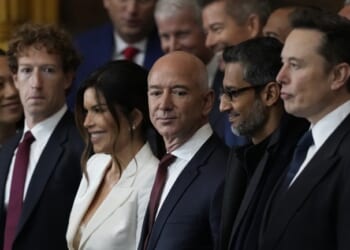IT’S HARD to believe that it was nearly 40 years ago, in 1986, that the Peacock Report first mooted subscription to replace the BBC licence fee. In due course, they said. Or that it is 22 years since David Elstein, the former chief executive of Channel Five, was appointed in 2003 to head a Conservative Party review of the future funding of the national broadcaster ahead of the renewal of its Royal Charter. It recommended the licence fee should be reduced and commercial broadcasters be allowed to bid for funding to make public service programmes.
If it sent a chill wind down the corridors of Broadcasting House, it was not for long. Like the NHS, the BBC has stood impregnable and unreformable. The hopeless Tories failed to bite the bullet not just then, but ten years later when the Charter came up for renewal again. ‘Due course’ has never arrived. Nor I doubt will it arrive in 2026
Critics of the BBC ‘tax’ point out that now, unlike their NHS dependency, people do have a choice – they do have somewhere else to go that they can afford. In fact the last twenty years have seen myriad sources of education, information and entertainment for people to turn to. Just within a few years of their launch, streaming services led by the US giants Netflix, Amazon Prime, Disney+ and Apple TV+ ‘had attracted voluntary subscriptions from nearly 70 per cent of UK households, even as the number of homes paying the licence fee started, unprecedentedly, to decline’, David Elstein observed before Christmas. The annual household exodus from the licence fee he noted was between 400,000 and 500,000.
So you would think, logically that the BBC’s time must finally be up, as the next Charter renewal approaches in 2026 as a new round of discussions has already started on the future of the BBC’s funding. Both the Labour Government and the BBC are said to be exploring ways to reform the licence fee and are reviewing the funding model. Will these reviews will ‘go far enough’? Or ‘will fall back on to tired platitudes and ignore the modern failings of the BBC’. That’s what the campaign group Defund the BBC fears – that once again the conclusion will be that the BBC is too ‘special’ to be subject to the marketplace of the media industry; that no funding model other than enforced taxpayer funding is suitable; that the funding reviews could also be quietly jettisoned at any point and plans for reform sidelined. Hence their report launched this week on the future of the BBC licence fee, Outdated, Outpaced and Out of Touch.
It states the obvious, yet again, that the licence fee is out of date and must be scrapped, that BBC has ‘stubbornly survived’ as the media world has ‘changed beyond recognition’. (They might have added a ‘why’, which I would suggest is down to successive governments who for their own reasons have wanted to keep the BBC onside.) Now they say it is an ‘adapt or die’ moment, that the BBC must move to a subscription model or be axed.
The report in many ways mirrors Mr Epstein’s argument, that its funding does not allow it to do what it is meant to do as exemplified by its Proms coverage, managing he noted to bring only 26 of last summer’s 73 Proms to our TV screens, and only six actually on the night of the performance. Therefore the argument goes it is neither in the best interests of the taxpaying public nor of the BBC.
In order to save this and other bits of BBC magic that the Defund the BBC report details it is time to ‘properly explore’ the commercialisation of the BBC and turn it into a subscription service like Sky or Netflix. It warns it is ‘rapidly becoming obsolete with precipitous falls in consumption between generations’ with the rapid switch to the ‘fundamentally different’ pattern of streaming platforms – a ‘defining change’ in how the public is choosing to watch television.
Elstein in his article also warns of a technological barrier currently propping up the licence fee disappearing: ‘This barrier is the legacy of installed viewing systems which incorporate a TV tuner (unlike a laptop, tablet or smartphone, which have smaller screens). Between 5million and 8million of these are replaced each year, each typically capable of bypassing live TV by use of broadband, but nearly all still including a TV tuner. If a major manufacturer chose to market a large smart screen without a tuner, eliminating the need to buy a TV licence, there might be a rush for the doors.’ The tipping point could come at a 30 per cent ‘at which the exodus [from the licence fee] gathers unstoppable pace’.
The Defund the BBC report details the stunning success of streaming platforms in ‘remarkable contrast to the decline of traditional broadcast TV’. Viewers will spend more on streaming services than traditional TV packages for the first time this year, they say. If this proves accurate, it will have taken only 13 years for streaming platforms to have eclipsed traditional broadcast media.
Their report also points out that the BBC has ‘lurched from failure to scandal in a seemingly unending cycle of mistakes and problems’ and the public’s view and support is ‘a long way from its rose-tinted heyday’; that people are looking at the BBC and find it ‘lacking judgement, lacking common sense and lacking the ability to remain impartial when many of its staff have clearly been captured by ideology.’ Scandals I would add that, because the BBC is unaccountable, they have shockingly got away with – ridden rather than lurched ove – leaving a trust deficit. Just 25 per cent of the UK believe that the BBC is ‘generally neutral’.
A running financial deficit despite a total income of nearly £6billion in 2023 – more than twice that of its longest-running domestic rival, ITV – you would think the writing was on the wall; that turning the BBC into a subscription service was a no brainer. Can best future for the BBC be ‘to continue to yoke the taxpayer to the unjust licence fee and continuing decline?’ they ask.
For the BBC and Labour, well yes. The BBC have not resisted subscription for 40 years to give into it now. Their ‘soft’ power as State supported monopoly is huge and they know it. It is far too important an instrument of state propaganda for any uniparty government to risk, particularly Labour. Despite the undeniable catalogue of failure – falling standards, limited coverage, inefficiency and licence fee collapse, it is just too powerful a driver of the progressive left, globalist political narrative for Labour to relinquish. This home grown British counter-disinformation service does not depend on Barb viewing figures. Its website thrives on the internet – even without its USAID support. With the full support of the State regulator Ofcom it is invincible. Take covid, lockdown and vaccine – who was more effective than the BBC in transmitting both fear and censure for non-compliance? That is why it has to go. In 2014 the BBC revealed unswerving preference for maintaining the licence fee; their dismissal of the subscription option backed up by a blog packed with 40 lies by their Head of Policy denounced by Elstein:’I have chosen to call them lies, because there is not the slightest attempt to present any kind of balanced picture. It is a bad faith exercise, and deserves the strongest epithet in condemning it.’
Is there any reason to believe the BBC will behave differently today?
As long as critics premise their lobbying on the appeasement tactic of ‘how can we guarantee “our” BBC and enhance the product on offer for Britons in a world of endless technological disruption?’ as MP Sir John Hayes’s puts it in the foreword to report, I suspect not.
It is not ‘our’ BBC and has not been for a long time. It has had the benefit of the doubt for far too long, cynically delivering only the wokest and most subversive of the Proms as a sop to its prior justification. It is not there to be ‘guaranteed’. No ifs or buts, the BBC licence fee has to be abolished, the Charter not put up for renewal. 100 years is enough. We don’t have a duty to save it. Critics mustn’t let sentiment crowd their judgment. That should be the warning and certainly a Reform UK commitment from Day One of their government.
You can read the Defund the BBC report here.






